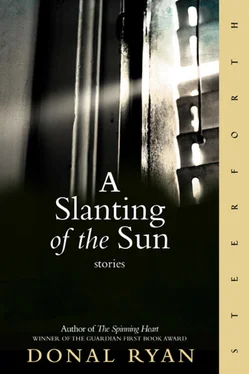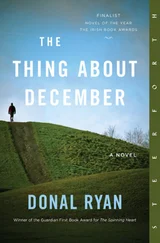I told him in return about Finbar. Fin – bar, he said. Finbar. This is a nice name, the name of a kind man. We’re sons of the same father, he said. We’re brothers. And I noticed then a movement in a leather holdall that was sitting open on a jump-seat near the cockpit door, and a kitten poked its white head up and looked at me, and held my eye, and disappeared again into its nest. My new friend half closed the bag’s top and whispered into the darkness of it: Sleep, little fellow.
He rose and beckoned to me to follow him through the cockpit door and he looked into my eyes and smiled sadly before drawing back a curtain that was closed across the plane’s passenger area. Two men sat slumped on reclined seats, each turned to half face the other, their heads back, their throats cut. Blood was blackening on their shirts, their mouths were open in rictuses of shock, their eyes were mercifully closed. This one, the pilot said, pointing at the dead man on the left, this one is the man who lied about my father, and had him jailed, and ordered that he be starved and beaten. And this one, he said, pointing at the other dead man, was a captain in the army of liberation that came to my village and took from my family all the things needed for living.
The kitten swished suddenly past my legs and down the steps to the tarmac and disappeared. I followed it down without looking back and ran into the afternoon sun, back towards the city. I stopped at the top of my road and looked down towards the shop with our flat above it, Jenny’s and mine, and remembered myself the way I used to be, before the thunderheads rolled in. I remembered sleep unscored by dreams of falling. I prised the key from the inside of my wristband and felt a burning where it had pressed against my flesh. I opened the wooden door and went upstairs and lay along the couch and slept, and woke in the evening, in the dying light, and saw Finbar, sitting in the armchair across from me. My runners were where I’d left them the night before, unworn, waiting. My gear was still draped on the wooden kitchen chair. My blood was darkening on the floor.
Come on, my father said. You’re okay now. Rise up out of it, son, and I’ll bring you home.
THERE’S GOING TO be war, my father said one day in 1914. Inside in Nenagh. I spied all the bould Fenians pelting off down the hill from Barbaha this morning early. Off in to roar and bawl outside the door of the Guardian office. Up in arms over recruitment posters. Not a hand’s turn done between them, I’d say. Lord but they must have great wives. There’ll be war, says he, and he shaking his head. Mark that now, ye can. Let ye not go in gawking, now, let ye not. Stay well away from all that. There’ll be lads taken to the barracks, as sure as God.
The Nenagh Guardian was that time owned and always was all along the years before by loyal subjects of their fragrant majesties beyond and Daddy said the likes of them was always minded like heifers in calf. It wasn’t until a year or two later, 1916 I’m nearly sure, that the Guardian was bought by the Ryans who own it still to this day. (No relations of mine except like as not the way all Ryans are related if you go far enough back along the ages.)
I’ll blister ye, Daddy said, if I hear of ye inside near the place. But I saw no crossness on his face as he turned away from my brothers and my sister and me, back to his foddering. As if such a thing was possible, that he’d have ever left a mark on one of his children. My gentle father, and he all about the war, the war.
The posters were torn down anyway and stamped into the mud and more were put up and the RIC ringed a man called Waxer Walsh and roped him and dragged him down Barrack Street and a small band of Irish Volunteers went about springing him and a man was shot in the arm and that was the finish of the hoo-hah for a good long while. But any man who went about answering the call of king and country that was printed by the Nenagh Guardian on those posters and on the front page of their newspaper was told to expect no peace or place in the Tipperary they’d return to. They’d choke on the bread the king’s shilling bought, and their families with them.
Robert Wesson Coleman was five or six years older than me. He gave many a day palling with us, only half in secret. He played hurling with my brothers above in the long acre and he showed them a rugby ball one time and their eyes widened in wonder. The quare shape of it. My sister was in love with him. I suppose I was too, but though I was younger I was less inclined to be fanciful or to be overtaken fully by such things the way Mary was. My eldest brother said he hated Rob Coleman because he was a dirty English land-robbing bastard but when we heard he’d fallen in Flanders Fields my brother went out to the barn and cried.
I read a poem years upon years later written by William Butler Yeats. Lord God it knocked the breath from my body and the words from my mind. It was about another Robert, though his name was not mentioned in the lines of the poem but in the explanation beneath, written by some professor of such things. Major Robert Gregory, the poem was presumed to be about, the son of Lady Gregory, and he for all the world by the sounds of it the very self-same as my Robert. A boy from a big house told he had a fealty and a duty to a foreign land by virtue of the blood in his body. The boy in the poem didn’t hate his enemy nor love his king; Kiltartan was his country, the poor of that place his people. That’s out there beyond Gort in County Galway. We went there for a spin one Sunday, and drove down into Coole Park to see the swans and the famous names carved into the trees. I got a terrible lonesome feeling. Your man Yeats couldn’t have known the thoughts that were in that boy’s head as he flew his fighter plane towards the heavens but my soul be damned if he was too far wrong.
There’s many a family of this place and here around lost a son or a brother or a father but never could they raise a stone or a cross in their honour. Their memories were buried in silence and shame. The Colemans, being free to fight for England, could commission plinths and plaques from the best of masons and fix them firm to the earth. And why wouldn’t they? Why wouldn’t they do their damnedest to keep on to their dear Robert in some way, in cold stone and carved words.
One of the Donnells of Gortnabracken came back, shell-shocked and nearly deaf. He made no bones about where he’d been and would stand aside for no man, regardless of rank or station. He’d set his face to hell and hadn’t flinched. But still and all he’d be silent for weeks and months at a time, hunched and white, then all of a sudden he’d be shouting and roaring around the pubs and streets, standing and kneeling at the wrong times in Mass and saying his prayers too loud and laughing, thinking the rest of the world was gone the same way as him. His brothers did their level best to quieten him, and his parents were warned by the Volunteers who by then had become the IRA to keep a rein on him; Father Fitzwilliam even beseeched from the pulpit on his behalf. The sacrifice he made, what he gave of himself; fighting in a just war blessed by God, and his right mind left behind him in Passchendaele.
I heard that boy of the Donnells – what’s this his first name was? – say more than once how there was a good many men of his battalion shot for not wearing their hats opposite officers or not saluting them properly or for other such niggardly transgressions. The Irish lads were dirt to them, nothing, not even human. Men that left this parish and ones like it, imagine, decent poor men that took themselves away from these green fields and rolling hills, to fight against a Kaiser for a king, were shot by little jumped-up Johnny Englishmen for not having their uniforms on properly, or for falling asleep, or for not lepping quick enough over the tops of trenches into the teeth of death. He was sent off for a finish to live with an old uncle that was left a childless widower above in Templetuohy. I heard he began drilling young lads up there for the IRA and that he blew himself to smithereens trying to make a barrel-bomb to roll out onto the road in front of a truckload of Black and Tans.
Читать дальше












